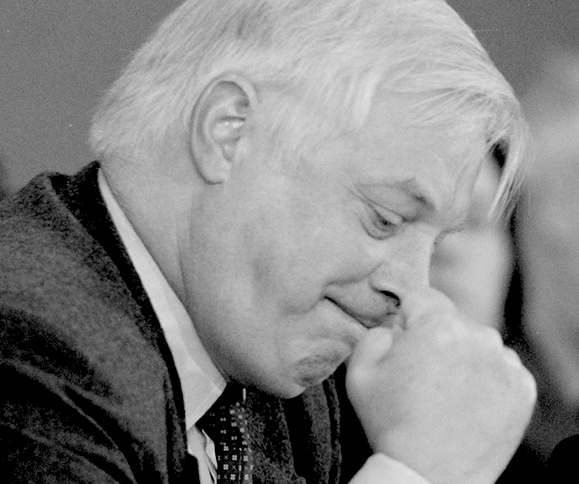The Republican and Nationalist communities suffered a blow in their efforts at police reform when Chris Patten, chair of the Patten Commission, endorsed the controversial Northern Ireland Police Bill which passed into law at the end of November. In the Belfast Telegraph Patten wrote that the new legislation, criticized by Nationalists as a watered-down version of the Patten Report, was faithful to the report and argued that young Nationalists should now feel free to join the new policing service.
When the 175 recommendations making up the Patten Report were issued in 1999, Patten himself argued that all of the recommendations should be adopted in their entirety and not “cherry-picked.” So it came as a shock when he expressed support for the Police Bill.
Republicans accused Patten of following a script prepared by the Northern Ireland Office. Sinn Féin chairman Mitchell McLaughlin observed, “He [Patten] certainly is silent…on the fact that the report has, in fact, been gutted by the British government. The powers that he set aside for the Policing Board, the Ombudsman and the International Oversight Commissioner now reside under the legislation with the Chief Constable and the Secretary of State.”
Under the newly enacted bill, Northern Ireland Secretary of State Peter Mandelson now has the power to prevent inquiries if they are deemed to “serve no useful purpose.” He has also assigned himself the power to order the Chief Constable to take steps in the interests of economy, efficiency, and effectiveness, a role Patten envisaged for the board.
In addition, Patten recommended that the Ombudsman should have the right to investigate and comment on police policies and practices. Under the Police Bill the Ombudsman may make reports but not investigate.
The Patten Report also recommended that the Policing Board have the ability to hold the police accountable, and to initiate inquiries into police conduct and practices. However, in the Police Bill Mandelson has prevented the board from inquiring into any act or omission that occurred before the bill was enacted. As Brendan O’Leary, author of Policing Northern Ireland, pointed out in the Irish Times, “This is an undeclared amnesty for past police misconduct.”
The Police Bill also deviated from the Patten Report on the topic of a new badge and flag. The Patten Report recommended that all emblems for the police service be free of association with the British or Irish governments and that the Union flag should not fly from police buildings. The bill fails to do any of this.
Unionists have opposed changing the Royal Ulster Constabulary’s (the police force) name and are only somewhat appeased by the assurance that the RUC’s title will be enshrined in the title deeds of the new force. The British government has stated, “The new name, the Police Service of Northern Ireland, will be used for all operational and working purposes, including whenever and in whatever circumstances the police interface with the public.” The new title is to be implemented on September 1, 2001. The issue of what badge the new police service will wear is still under debate.
The Bill also limits the powers of the Oversight Commissioner, intended by Patten to “supervise the implementation of our recommendations.” Under the Police Bill, the commissioner’s role is now limited to overseeing changes “decided by the government.” O’Leary argues, “It is essential that the Taoiseach and Mr. Cowen (Irish Minister for Foreign Affairs) press for the Oversight Commissioner’s role to be that envisaged by Patten. That would create the possibility that the full implementation of Patten could occur later, and help avert a crisis.”
Sinn Féin has rejected the new Police Bill outright and has stated that it would not nominate members to the Police Board, to which the new Police Service will be held accountable, and that it could not recommend that Nationalists join the new policing service when recruiting begins. As Gerry Adams pointed out in The Irish Voice, “If the British government really wanted to implement the Patten recommendations, they could do so. And no one who is truly committed to a genuinely new beginning to policing can or should give up on this objective. We should not be bullied, or coaxed or cajoled or pressurized by the British government, or anyone else in accepting less than our entitlements.”
The SDLP have taken a less extreme stance. While it finds the dilution of the Patten Report unacceptable, it hopes to gain further assurances from the British government about how it plans to implement the new Bill before deciding whether or not it would nominate ministers to the board.
Not surprisingly, Peter Mandelson welcomed Patten’s endorsement, and appealed to the SDLP to cooperate, stating, “Let’s get everyone involved, assuming their responsiblities, to create the new Police Service of Northern Ireland and leave the politicking behind us once and for all.
“It is not my place to tell the SDLP when they should make up their minds,” he continued. “All I would say is that the politics of boycott did not bring us the Good Friday Agreement and it won’t bring us the new police service that we want to create in Northern Ireland either.” Sir Ronnie Flanagan, Northern Ireland’s chief constable, stated that the police were determined to implement the changes outlined in the Bill, but Tom Constantine, the American who will act as Oversight Commissioner, said the proposed changes could take seven to ten years. ♦


Leave a Reply